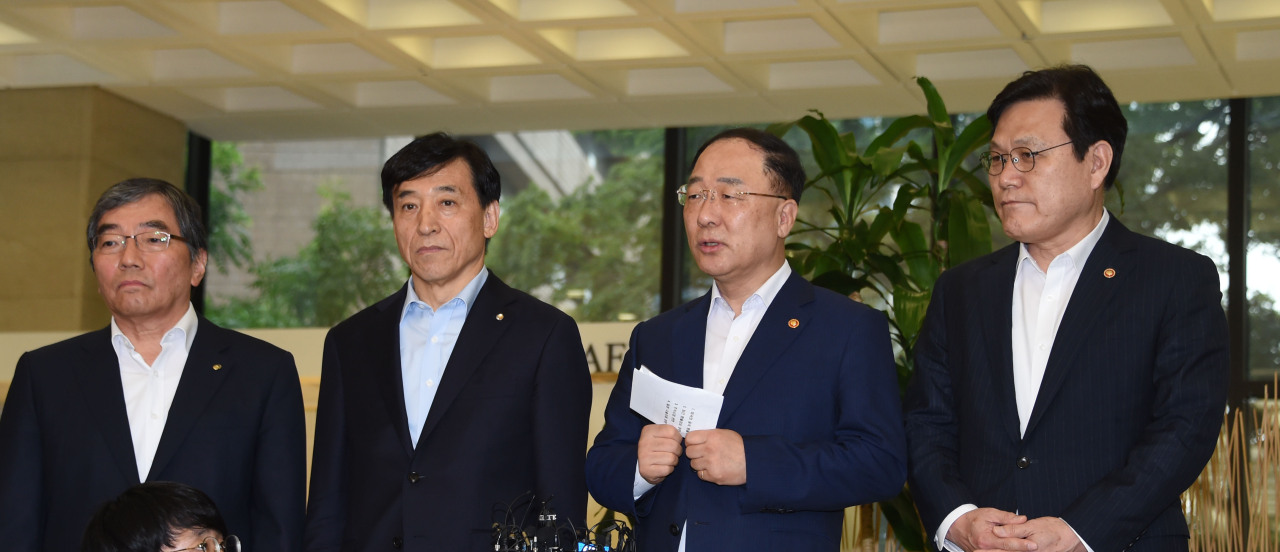South Korea’s financial authorities vowed Wednesday to take preemptive stabilizing measures, responding to the latest local stock market crash incurred in line with the intensifying US-China trade feud and Japan’s export curbs against Korea.
Their action plan includes aggressive government interferences such as reinforced regulations on stock short-selling and alleviated rules on treasury stock purchases, as well as possible intervention in the currency market.
“The government will respond on time in a swift and bold manner, based on a prepared contingency plan,” said Deputy Prime Minister and Finance Minister Hong Nam-ki in an urgent macroeconomic-finance meeting with Bank of Korea Gov. Lee Ju-yeol, Financial Services Commission Chairman Choi Jong-ku and Financial Supervisory Service Gov. Yoon Suk-heun.
 |
(Ministry of Economy and Finance) |
Such a meeting is conventionally chaired by the first vice minister of economy and finance, but the nation’s fiscal chief took over this time, reflecting the government’s urgency amid the latest developments. It was the first time that the deputy prime minister chaired the meeting since September 2017.
The gathering took place in the wake of the nation’s stock market crash, which apparently was attributable to mounting trade tension between Washington and Beijing as well as economic friction between Seoul and Tokyo.
On Wednesday, the benchmark Kospi closed at 1,909.71, down 7.79 points or 0.41 percent from the previous day, renewing its lowest record in more than three years. The secondary Kosdaq climbed slightly to 564.64, up 13.14 points or 2.38 percent from the previous day, but continued to linger below the psychologically significant 600 point mark under the prolonged impact of this week’s “Black Monday.”
“The four (financial) policy authorities share grave awareness concerning the increased volatility in financial and foreign exchange markets both here and abroad,” Hong said.
As detailed examples of market stabilizing steps, the minister mentioned a supply stabilization program for the local stock market, deregulations on companies’ treasury stocks and enhanced rules on short-selling.
He also underlined that the government could interfere to a certain extent in the currency market, as necessary.
“It is internationally acceptable (for authorities) to make some ‘fine-tuning’ actions when the market faces excessive fluctuations,” Hong said, adding that such moves would not trigger currency manipulation problems with the US.
Since March this year, Seoul has been revealing its level of currency market interference in a gesture to be exempted from the US Treasury’s watch list for potential currency manipulating countries.
The central bank chief echoed the finance minister’s remarks, acknowledging the need for market stabilizing actions, possibly including further monetary easing.
“(We) could consider monetary policy responses, if circumstances so require,” BOK Gov. Lee said, when asked about the possibility of further rate cuts. “But it is still too early to discuss rate cut scenarios as we need to keep watch on situations.”
Last month, the BOK cut the country’s base interest rate by 25 basis points to 1.5 percent, in an earlier-than-expected easing gesture amid rising uncertainties.
Meanwhile, the Ministry of Land, Infrastructure and Transport confirmed recently that it will unveil a price ceiling system for private housing next week, as previously planned.
Speculation had been building that the government may choose to postpone its housing price curbs amid the latest economic turbulence in fear of further market plunges here.
(
tellme@heraldcorp.com)








![[Today’s K-pop] Blackpink’s Jennie, Lisa invited to Coachella as solo acts](http://res.heraldm.com/phpwas/restmb_idxmake.php?idx=644&simg=/content/image/2024/11/21/20241121050099_0.jpg)